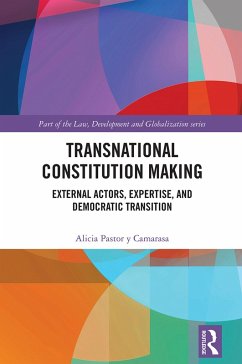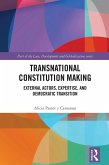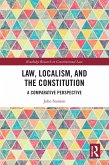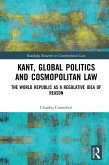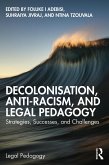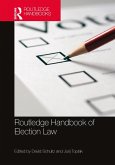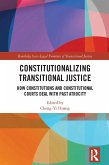Alicia Pastor Y Camarasa
Transnational Constitution Making (eBook, ePUB)
External Actors, Expertise, and Democratic Transition
42,95 €
42,95 €
inkl. MwSt.
Sofort per Download lieferbar

21 °P sammeln
42,95 €
Als Download kaufen

42,95 €
inkl. MwSt.
Sofort per Download lieferbar

21 °P sammeln
Jetzt verschenken
Alle Infos zum eBook verschenken
42,95 €
inkl. MwSt.
Sofort per Download lieferbar
Alle Infos zum eBook verschenken

21 °P sammeln
Alicia Pastor Y Camarasa
Transnational Constitution Making (eBook, ePUB)
External Actors, Expertise, and Democratic Transition
- Format: ePub
- Merkliste
- Auf die Merkliste
- Bewerten Bewerten
- Teilen
- Produkt teilen
- Produkterinnerung
- Produkterinnerung

Bitte loggen Sie sich zunächst in Ihr Kundenkonto ein oder registrieren Sie sich bei
bücher.de, um das eBook-Abo tolino select nutzen zu können.
Hier können Sie sich einloggen
Hier können Sie sich einloggen
Sie sind bereits eingeloggt. Klicken Sie auf 2. tolino select Abo, um fortzufahren.

Bitte loggen Sie sich zunächst in Ihr Kundenkonto ein oder registrieren Sie sich bei bücher.de, um das eBook-Abo tolino select nutzen zu können.
This book examines the largely neglected, but crucial role of transnational actors in democratic constitution-making.
- Geräte: eReader
- mit Kopierschutz
- eBook Hilfe
Andere Kunden interessierten sich auch für
![Transnational Constitution Making (eBook, PDF) Transnational Constitution Making (eBook, PDF)]() Alicia Pastor Y CamarasaTransnational Constitution Making (eBook, PDF)42,95 €
Alicia Pastor Y CamarasaTransnational Constitution Making (eBook, PDF)42,95 €![Law, Localism, and the Constitution (eBook, ePUB) Law, Localism, and the Constitution (eBook, ePUB)]() John StantonLaw, Localism, and the Constitution (eBook, ePUB)42,95 €
John StantonLaw, Localism, and the Constitution (eBook, ePUB)42,95 €![Kant, Global Politics and Cosmopolitan Law (eBook, ePUB) Kant, Global Politics and Cosmopolitan Law (eBook, ePUB)]() Claudio CorradettiKant, Global Politics and Cosmopolitan Law (eBook, ePUB)42,95 €
Claudio CorradettiKant, Global Politics and Cosmopolitan Law (eBook, ePUB)42,95 €![Decolonisation, Anti-Racism, and Legal Pedagogy (eBook, ePUB) Decolonisation, Anti-Racism, and Legal Pedagogy (eBook, ePUB)]() Decolonisation, Anti-Racism, and Legal Pedagogy (eBook, ePUB)37,95 €
Decolonisation, Anti-Racism, and Legal Pedagogy (eBook, ePUB)37,95 €![Routledge Handbook of Election Law (eBook, ePUB) Routledge Handbook of Election Law (eBook, ePUB)]() Routledge Handbook of Election Law (eBook, ePUB)46,95 €
Routledge Handbook of Election Law (eBook, ePUB)46,95 €![Constitutionalizing Transitional Justice (eBook, ePUB) Constitutionalizing Transitional Justice (eBook, ePUB)]() Constitutionalizing Transitional Justice (eBook, ePUB)42,95 €
Constitutionalizing Transitional Justice (eBook, ePUB)42,95 €![Human Rights and America's War on Terror (eBook, ePUB) Human Rights and America's War on Terror (eBook, ePUB)]() Human Rights and America's War on Terror (eBook, ePUB)42,95 €
Human Rights and America's War on Terror (eBook, ePUB)42,95 €-
-
-
This book examines the largely neglected, but crucial role of transnational actors in democratic constitution-making.
Dieser Download kann aus rechtlichen Gründen nur mit Rechnungsadresse in A, B, BG, CY, CZ, D, DK, EW, E, FIN, F, GR, HR, H, IRL, I, LT, L, LR, M, NL, PL, P, R, S, SLO, SK ausgeliefert werden.
Produktdetails
- Produktdetails
- Verlag: Taylor & Francis
- Seitenzahl: 232
- Erscheinungstermin: 14. Juni 2024
- Englisch
- ISBN-13: 9781040035856
- Artikelnr.: 70467977
- Verlag: Taylor & Francis
- Seitenzahl: 232
- Erscheinungstermin: 14. Juni 2024
- Englisch
- ISBN-13: 9781040035856
- Artikelnr.: 70467977
- Herstellerkennzeichnung Die Herstellerinformationen sind derzeit nicht verfügbar.
Alicia Pastor y Camarasa is a researcher at the Swiss Graduate School of Public Administration at the Faculty of Law, Criminal Justice, and Public Administration of the University of Lausanne, Switzerland.
About the author
Acknowledgements
List of acronyms and abbreviations
Introduction: demystifying 'We the People'
Understanding constitutional drafting as a transnational site
Transnational constitution-making in current debates
The porosity of constitutional legal orders
The transnational regulatory web
Epistemological and methodological considerations
Law and society approach to constitution-making
Scope of the present study
Limitations of the study
Why read this book
Chapter overview
PART 1 Crafting a new theory: from constituent power to the development enterprise
1 The limits of constituent power for transnational constitution-making
Constituent power as a foundational concept for the liberal constitutional state
Constitutions as a legal tool to limit government power
The people are sovereign
Constituent power as the foundation of the constitutional legal order
Inherent limitations of analysing transnational constitution-making through the lens of constituent power
Between liberal constitutionalism and legal positivism
Implications for the analysis of external actors in constitution-making processes
Towards an antifoundationalist approach to constitution-making
Conclusion
2 Unpacking liberal legalism
Law as an instrument for social change
Rational law to reach political and economic development
Weber, rationalisation, and the law
New bottles, old wine: the many shapes of legal rationality in the development enterprise
The West as the ultimate stage of development
The colonial lineage of the modernisation rationale
From the 'mission civilisatrice' to development
Political development equals liberal democracy
Conclusion
3 The figure of the expert
Framing problems in the development enterprise
Recasting social problems as technical problems
Legal experts to the rescue
The expert as holder of technical knowledge
Knowledge from training
Knowledge from participation
The expert as political outsider
'Apolitical' ideology
At the service of the 'common good'
Apolitical ideology with political consequences
Conclusion
PART 2 External actors in constitution-making as a development enterprise
4 Tracing external actor involvement from decolonisation to post-cold war constitution-making
Constitution-making as a tool to achieve political change
The constitution factory: from Whitehall to the White House
Post-cold war constitution-making as a tool for peace-building and democratic governance
Liberal constitutions to achieve political development
Liberal constitutions as a signifier of 'civilisation'
The end of history and the liberal constitution
Conclusion
5 The expert as a key actor in transnational constitution-making
Involvement of constitutional experts in constitution-making processes
Drafting constitutions in the context of decolonisation
Development decades and the rise of US constitutional experts
The institutionalisation of transnational constitutional expertise
Justifying involvement with specific knowledge
Constitutional experts in the British Empire
The 'technician of democracy' as the expert
External actors as 'neutral' providers of constitutional expertise
Outside the political process
The discursive turn towards 'technicity'
Conclusion
Conclusion: towards a new theory of constitution-making
Law and society approach to constitution-making and the value of descriptive work
Constitutions within regulatory webs: governing by objectives
The development enterprise: an antifoundationalist vision of constitution-making
The politics of constitutional expertise
En route to a new normative theory
References
Index
About the author
Acknowledgements
List of acronyms and abbreviations
Introduction: demystifying 'We the People'
Understanding constitutional drafting as a transnational site
Transnational constitution-making in current debates
The porosity of constitutional legal orders
The transnational regulatory web
Epistemological and methodological considerations
Law and society approach to constitution-making
Scope of the present study
Limitations of the study
Why read this book
Chapter overview
PART 1 Crafting a new theory: from constituent power to the development enterprise
1 The limits of constituent power for transnational constitution-making
Constituent power as a foundational concept for the liberal constitutional state
Constitutions as a legal tool to limit government power
The people are sovereign
Constituent power as the foundation of the constitutional legal order
Inherent limitations of analysing transnational constitution-making through the lens of constituent power
Between liberal constitutionalism and legal positivism
Implications for the analysis of external actors in constitution-making processes
Towards an antifoundationalist approach to constitution-making
Conclusion
2 Unpacking liberal legalism
Law as an instrument for social change
Rational law to reach political and economic development
Weber, rationalisation, and the law
New bottles, old wine: the many shapes of legal rationality in the development enterprise
The West as the ultimate stage of development
The colonial lineage of the modernisation rationale
From the 'mission civilisatrice' to development
Political development equals liberal democracy
Conclusion
3 The figure of the expert
Framing problems in the development enterprise
Recasting social problems as technical problems
Legal experts to the rescue
The expert as holder of technical knowledge
Knowledge from training
Knowledge from participation
The expert as political outsider
'Apolitical' ideology
At the service of the 'common good'
Apolitical ideology with political consequences
Conclusion
PART 2 External actors in constitution-making as a development enterprise
4 Tracing external actor involvement from decolonisation to post-cold war constitution-making
Constitution-making as a tool to achieve political change
The constitution factory: from Whitehall to the White House
Post-cold war constitution-making as a tool for peace-building and democratic governance
Liberal constitutions to achieve political development
Liberal constitutions as a signifier of 'civilisation'
The end of history and the liberal constitution
Conclusion
5 The expert as a key actor in transnational constitution-making
Involvement of constitutional experts in constitution-making processes
Drafting constitutions in the context of decolonisation
Development decades and the rise of US constitutional experts
The institutionalisation of transnational constitutional expertise
Justifying involvement with specific knowledge
Constitutional experts in the British Empire
The 'technician of democracy' as the expert
External actors as 'neutral' providers of constitutional expertise
Outside the political process
The discursive turn towards 'technicity'
Conclusion
Conclusion: towards a new theory of constitution-making
Law and society approach to constitution-making and the value of descriptive work
Constitutions within regulatory webs: governing by objectives
The development enterprise: an antifoundationalist vision of constitution-making
The politics of constitutional expertise
En route to a new normative theory
References
Index
